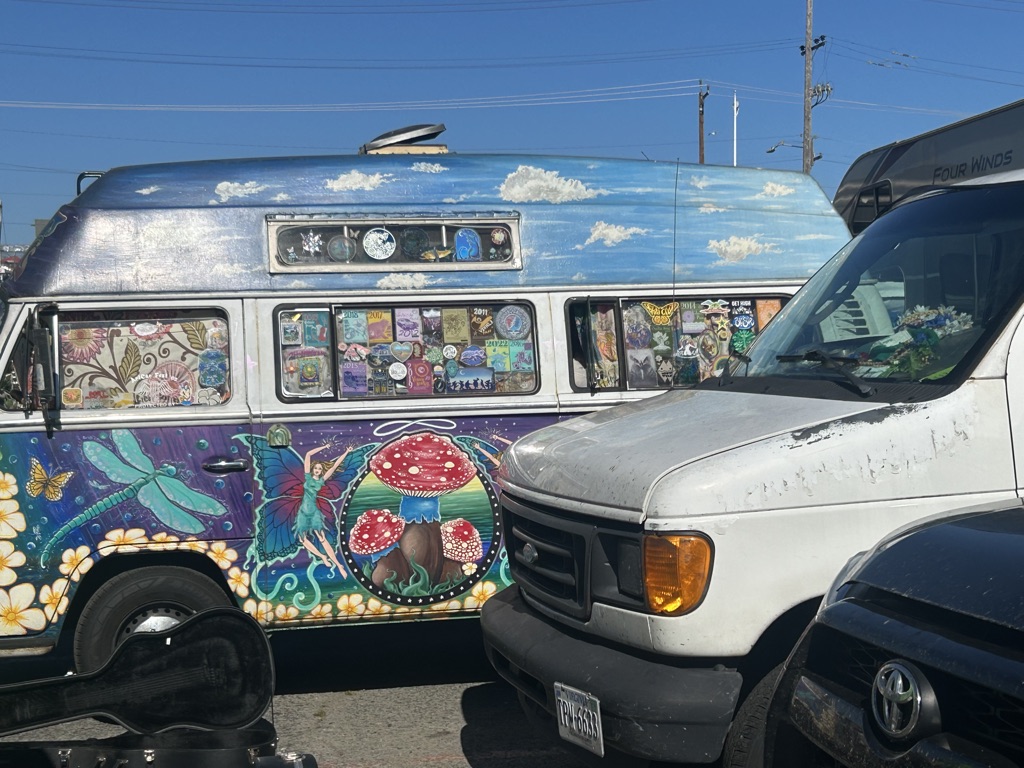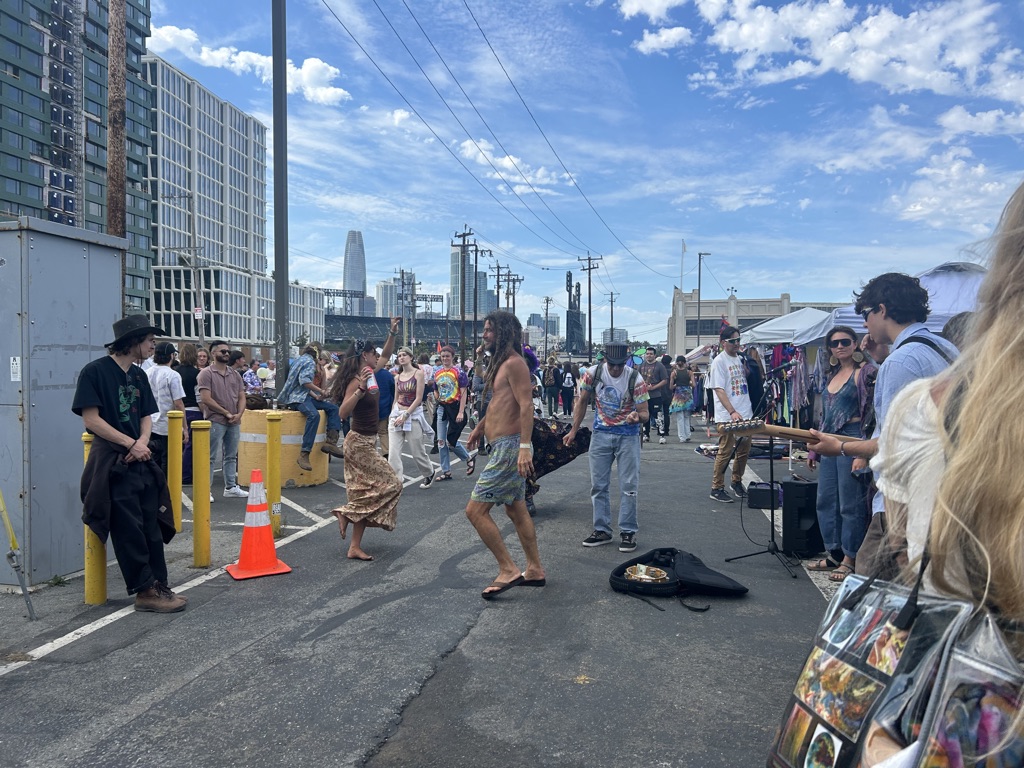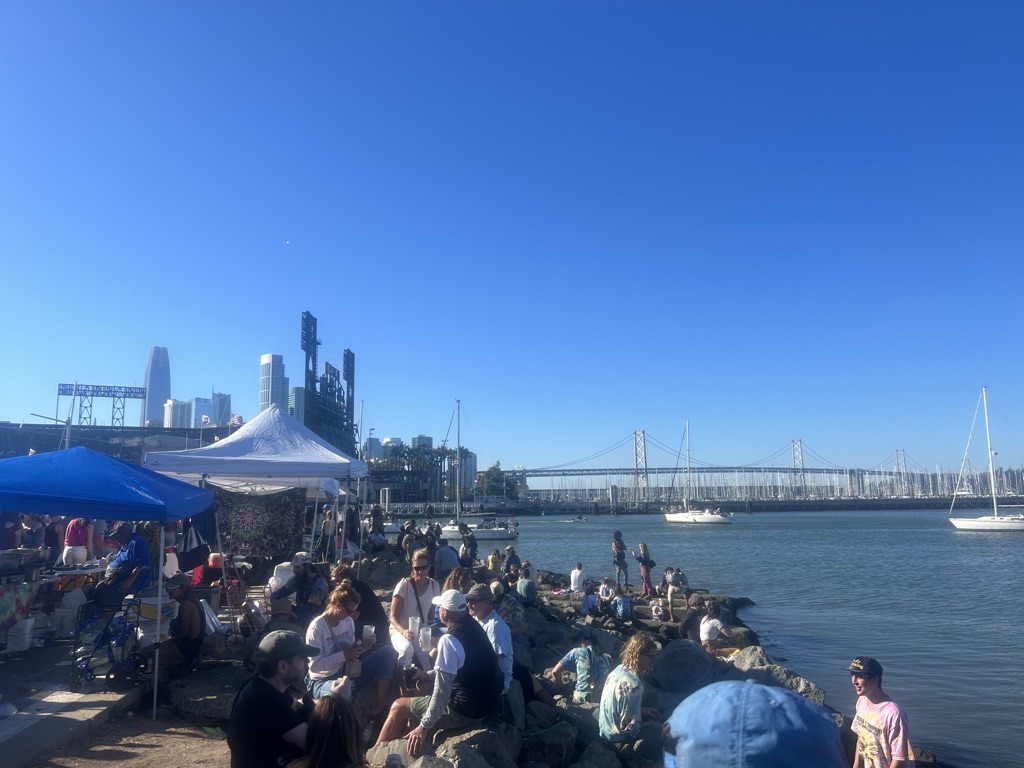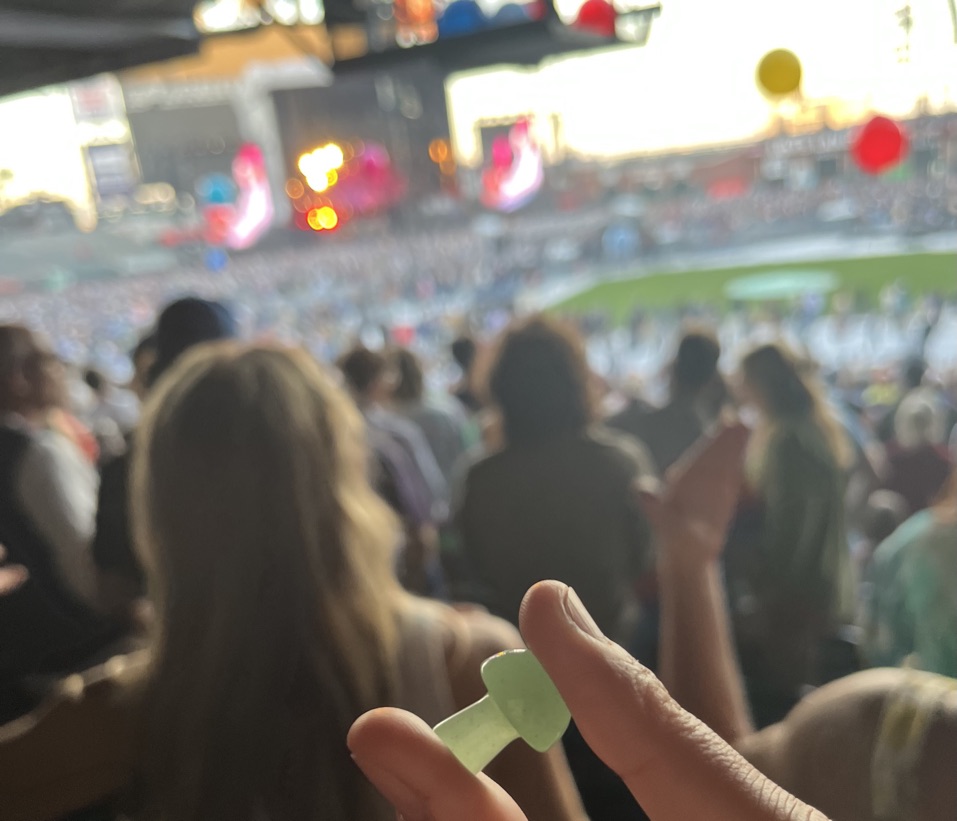
A very cool van. Photographs by Sophie Haigney.
We went to the lot. The lot, my younger brother observed—he was a first-time Dead & Co. show attendee—was “literally just a parking lot.” In fact it was a parking lot adjacent to the Port of San Francisco and near the SFPD headquarters, where I used to go for press conferences when I was a crime reporter. It was a vast parking lot, not far from the stadium where the second-to-last Dead & Co. show was going to start in two hours, and it was full of Deadheads.
The lot is the scene outside every show, known colloquially as Shakedown Street. It’s more or less an open-air drug market, that phrase that gets thrown around a lot to describe other parts of San Francisco; it is also the locus of the vestiges of real hippie culture. There is nothing like it anywhere else. There are vans that have been on the road for months, vans painted with psychedelic mushrooms, vans covered in stickers that say “Make America Grateful Again” and “Thank you Bobby.” People sell T-shirts, an endless array of T-shirts in every imaginable version of tie-dye. People sell quesadillas. People sell nitrous oxide—lots of it; in fact, the unmistakable hiss of nitrous and the constant popping of balloons is one of the most disconcerting features of being outside a Dead show. People sell funny hats. People sell, confusingly, a lot of rocks. I saw a sign next to a big box of rocks that said BUY 1 GET 1 FREE.
Being on the lot is basically just about wandering around and looking at stuff, so that’s what we did. One of my friends wanted to get a new Online Ceramics Dead T-shirt; another one wanted to buy a tiny ceramic mushroom to hold during the concert. My brother and I weaved in and out of some stalls, looking at shirts and stickers that said things like “Not like other girls” and “5-8-1977 was an inside job.”
“There was this apple last night that I was eating and I couldn’t stop eating it, I even ground up the seeds and then I think I was worried that I had arsenic in my body, so I got a bit disturbed during ‘Space,’ ” I heard one guy telling his friend, bent over a camping stove where he was frying some onions and nursing a beer.
I waited in line for a porta-potty, but the man in front of me came out and said, “That’s really bad … really not good for women.” So I did not go in. Another guy assured his friend, in a thick Boston accent, “You could piss in there bro.”
“Time to go see my FIRST husband,” yelled a woman in a long tie-dye dress who looked like she was twenty-five.

The lot, which is a parking lot.
Someone nearby was shaking a tambourine.
“You’re so fucking cool, man,” said an older hippie to a young woman he was splitting a watermelon with. “You should keep this.”
“No way,” she said. “You never know when you’re gonna need a watermelon.” They exchanged Facebook information.
“We have enough acid to kill an elephant,” a tall guy in a “Jack Straw” shirt reassured his buddy, who had been worried that they’d need to get more.
I shared my location with my aunt, who was also supposed to be at the show that night; she and I are always trying and failing to meet up at Dead shows, because it is very hard to meet up in a crowd of forty thousand people. It’s often all you can do not to lose your friends. In fact I had lost track of my brother, so I texted him “You good?” and he hearted the message. He was on his own journey now.
I marveled at some T-shirts. “The thing that sucks is I always want to buy a Dead shirt at a show, but then I’m already wearing a Dead shirt, so it’s not a good time to buy a Dead shirt,” someone said, and I agreed.
My friend was not having much luck finding her tiny ceramic mushroom. “You would think this would be the perfect market for tiny ceramic mushrooms,” our other friend lamented with her.
“They’re giving away free hot dogs on wook beach,” another friend texted, referring to the strip of rocks off the lot that extended into the bay. (Wook, if you’re not familiar, is a derogatory term that derives from the Star Wars movies and refers to dirty long-haired guys who follow jam bands around. We love wooks.) I went down to wook beach, though I declined the hot dog.

Wook beach.
It was really the most beautiful place in the world. San Francisco, where I am from, is a breathtakingly beautiful city, and it was at its best that day, cool and sunny down by the water. San Francisco is where it all began—the Dead, of course, in 1965, and also my own life, thirty years later. I thought about this while I sunned myself on the rocks with my friends, and started to get a little sentimental, but then it was time to go to the show.
There was a massive bottleneck on the way into the stadium, people coming from all directions and trying to form a line and squeezing up against each other. “If you walk sideways, you’ll be half your size,” someone observed, and we all tried walking sideways for a bit. All around us people were raising one finger in the air, which is the sign that means “I need a miracle,” or, one ticket to the show tonight. A girl with long armpit hair was holding up a sign that said, “Tired of smelling my stinky pits? Sell me your extra.”
My friends and I lost each other and then found each other again, near the gate. We waited for our last friend, who had texted to say she’d fallen behind. When she caught up with us she was beaming. “I found my tiny mushroom!” She held up a translucent green mushroom about the size of a thimble, and she proceeded to hold it all night long, all through the show.

Sophie Haigney is the web editor of The Paris Review.
from The Paris Review https://ift.tt/Ow8oZva
Comments
Post a Comment